Jen Silverman’s absurdist dark comedy "Bonnets (how ladies of good breeding are induced to murder)" is a feisty feminist fable
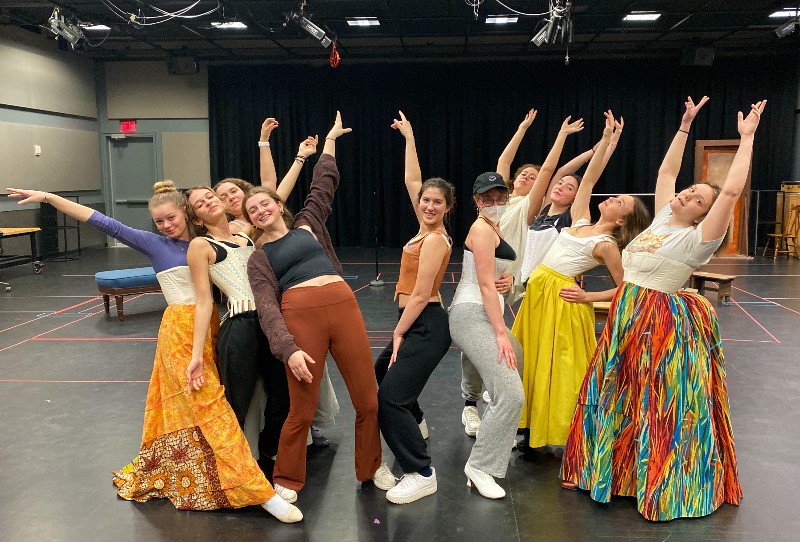
Jen Silverman’s Bonnets (how ladies of good breeding are induced to murder) is so violent that it took a fight director and two assistants to choreograph it. Death by poison arrow, chainsaw, Ninja—it’s all there for your delight and horror. Even God, a character in the play who opens every scene, is powerless to stop it.
The chorus of one song in Bonnets goes like this:
Chop, chop, chop, chop, chop, chop
We killed a man a-piece and we just couldn't stop!
Glug, glug, glug, glug, munch, munch,
Join me for tea-time, you might not live to lunch.
Will anyone survive in the dark comedy that runs February 16-19 at Lydia Mendelssohn Theatre?
Pricilla Lindsay, who directs University of Michigan theater students, says the play shifts between three eras. “Silverman picked three of the many times men have subjugated women—Salem in 1690, England in the 1890s, and France in the 1600’s, during the reign of Louis XIV. All three periods are not special but indicative of women being moved to the side. In our play, women wreak havoc and get revenge by actually murdering.”
These women don’t stop at killing their abusers.
“A young girl who is having an affair with a married man accuses his wife of being a witch,” Lindsay says. After his wife hangs, the man decides to leave for Boston—without his young paramour. ”You’re dead to me,” she declares.
In this play, that can only mean one thing.
Ann Arbor Musical Theater Works Brings The Cult Musical “Moby Dick” to the Children’s Creative Center

What’s weirder than learning that there’s a stage musical adaptation of Herman Melville’s Moby Dick?
Learning there are two, actually, one from 1990 and another from 2019.
And the Moby Dick adaptation that came first, which includes a book by Robert Longden along with music and lyrics by Longden and Hereward Kaye, is the one that local theater artist Ron Baumanis has been jonesing to stage via his company, Ann Arbor Musical Theater Works.
“Whenever I see a show, whether it’s on Broadway or the West End, I always leave thinking, ‘Would I want to do it or not,’” said Baumanis, whose Moby Dick production begins its two-week run February 9 at The Children’s Creative Center.
“When I saw this in the West End, by intermission, I thought, ‘I’ve absolutely got to do this show someday.’ … I was drawn to the weird mix of the show’s all-out hilarious comedy with British pantomime and a lot of burlesque elements.”
It’s All Relative: Ann Arbor Author Jim Ottaviani Examines Albert Einstein’s Complexity in “Einstein” Graphic Biography
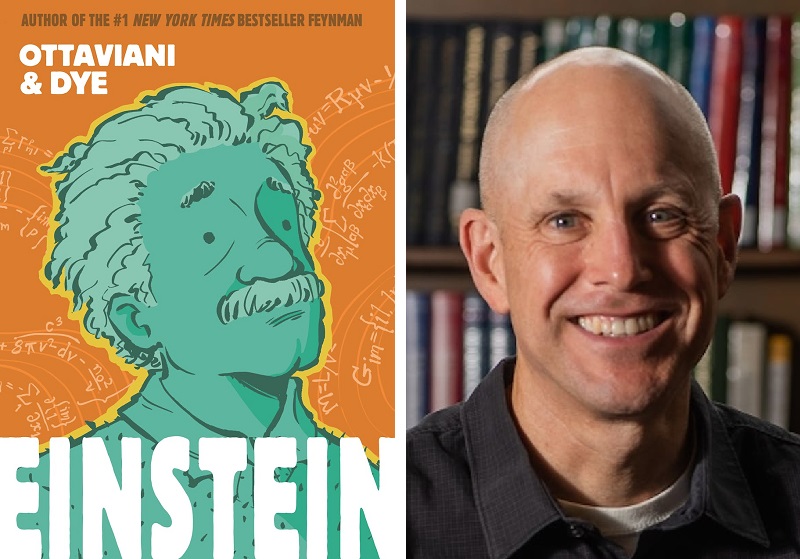
When longtime Ann Arborite Jim Ottaviani decided to write a graphic novel about Albert Einstein with artist Jerel Dye, his first concern was doing the research and trying not to drown in it.
“Deadlines are your pal in this regard, in that, there comes a time when I just have to start writing,” said Ottaviani, author of Einstein and a former nuclear engineer and librarian who previously worked at the University of Michigan.
“I cannot put it off one more day, one more minute. Now, this doesn’t stop me from sometimes thinking, ‘I should just read this one other thing.’ But then you quickly realize there’s a hundred more things you could read, too.”
Ottaviani speaks from experience, having already published similar graphic novels focused on science giants like Stephen Hawking and Richard Feynman. The amount of content available on those icons initially gave him some pause, too, but the resulting books’ success made a convincing case for a project focused on Einstein.
“Everybody knows the name Einstein, and they know that he’s associated with relativity, but few people know why it’s important or what it is,” said Ottaviani. “The hope is that after reading this book, people will at least know what it is and why it’s important to physics. Yes, there are equations in the book, and they’re accurate, but they’re mostly there as set dressing.”
Voices Carry: Annie Capps Shares Stories of Vulnerability and Courage on “How Can I Say This?” Album

Annie Capps doesn’t hesitate to reveal her authentic self—both past and present—on her latest album, How Can I Say This?
The Chelsea folk singer-songwriter embraces both vulnerability and courage across the album’s dozen reflective tracks, which revisit pivotal life lessons about forgiveness, family, and growth.
“I think we’re always vulnerable, and I don’t want to take anything away from people who aren’t willing to go where I went,” said Capps about her first solo release. (She usually writes, records, and performs with husband and longtime musical partner Rod Capps.)
“Just the act of standing up in front of people and singing a song, whether it’s your own or not, is a very vulnerable situation. That’s brave, and I commend anybody who does it or tries it.”
Collectively, those thoughts merge into an overarching love letter Capps writes to her younger self throughout How Can I Say This? Forthright lyrics and demonstrative Americana-folk-jazz instrumentation provide an emotive setting as she excavates deeply buried experiences.
Understorey Time: Ann Arbor’s Jess Merritt Celebrates Her 40th Birthday and a Return to the Stage at The Ark

Some say reaching 40 is a milestone but that each decade lived should be celebrated.
Ann Arbor singer-songwriter Jess Merritt will take The Ark stage on February 13 to celebrate all of her decades as well as her 40th birthday, recent life changes, and what is yet to come.
“I’m so grateful to be celebrating this new chapter of life with The Ark and that they were willing to put this on,” said Merritt who used to be known as Jess McCumons when she co-led the soul, rock, and blues band The Understorey. “It feels so great to be getting back to the stage after a few years away, and this is a really big way to kick things off at my favorite place to perform.”
U-M Professor Kiley Reid’s Novel “Such a Fun Age” Is the 2023 Washtenaw Read Book

The 2023 Washtenaw Read is Such a Fun Age by University of Michigan professor Kiley Reid, whose plot-driven novel details what happens and how people feel amidst misunderstandings and omissions around a recent run-in and past hurts.
Reid is having a talk, reading, and Q&A session at the Downtown Library February 5 at 4 pm.
The lives of characters Emira Tucker and Alix Chamberlain very quickly intertwine in ways beyond their relationship as babysitter and mother of a toddler, respectively. From the description on the book jacket, readers know going into the book that Emira, who is a Black woman, is confronted for having Alix’s white child, Briar, at a food market late in the evening. This unexpected and unfair confrontation leads to connections, coincidences, and consequences that unfold throughout the rest of the book. The ensuing events are best experienced page by page as one reads.
Reid develops each of the main characters with their own flaws. The characters’ actions raise dilemmas based on how much they know and what their position is in each situation. Perhaps one lesson is that one’s intentions do not always make things right. Mrs. Chamberlain illustrates this in an overbearing statement to Emira:
“You might be too young to understand this right now, but we have always had your best interests at heart. Emira, we, we love you.” Mrs. Chamberlain threw her hands up in surrender as she said this, as if loving Emira was despite her family’s other best interests.
Poet and EMU Lecturer Andre F. Peltier Imagines New Contexts for Pop Culture Icons in Recent Chapbook, “Poplandia”
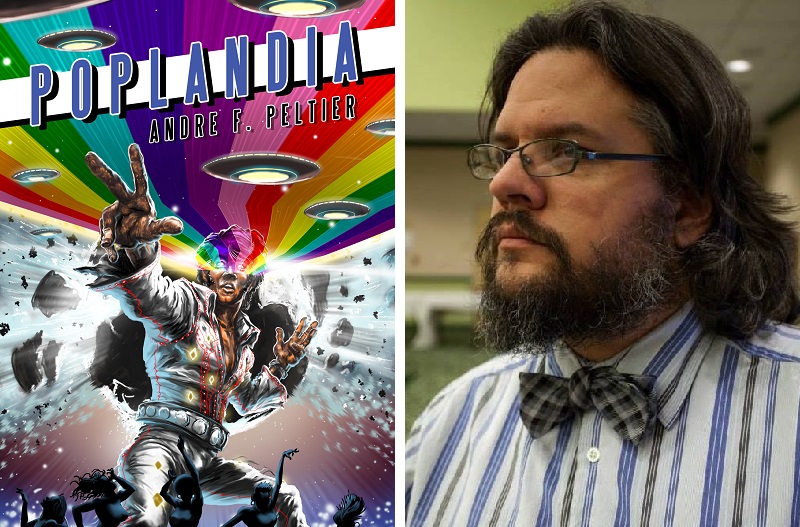
Part tribute, part humor, and part elegy, the new chapbook Poplandia by Andre F. Peltier centers on epic moments, including epic scenes in movies like the "Yub Nub" Ewok celebration to epic memories like recalling the purchase of a new record when it was released. The poet lives partially in this world and partially in others by reviving late 20th century childhood longings, such as to live in the Star Wars galaxy, among others.
One such dream deals directly with poetry itself:
Intro to Poetry anthology.
Dial up a poem on
poetry.org.
Go to open mic poetry nights
or listen to slams in coffee houses.
Find a poem
that won’t be improved by adding
Godzilla…
It can’t be done.
In Peltier’s perspective, life, literature, films, shows, and music should be interchangeable and allow humans and characters to cross boundaries between worlds or break through the fourth wall.
Searching for the Right Words: Julia Cho's award-winning "The Language Archive" makes its Michigan debut at Theatre Nova
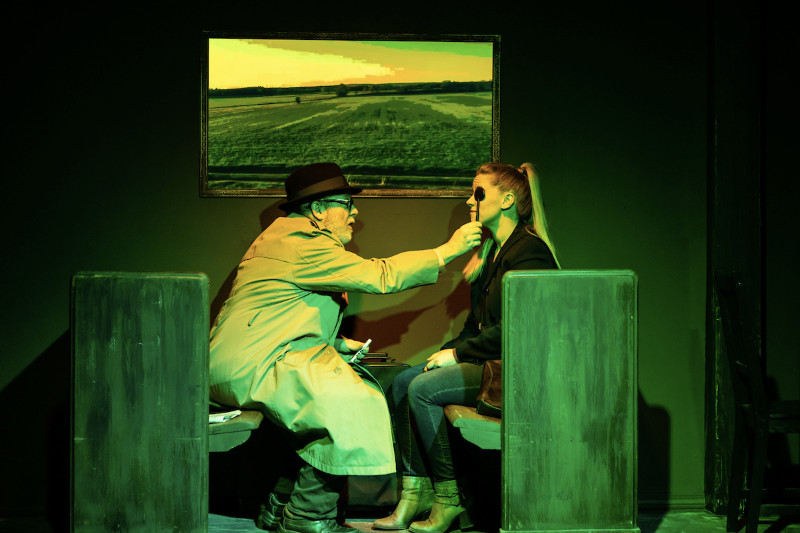
When Julia Cho read about dying languages, she wondered if losing a language meant something larger—losing a whole way of looking at the world.
In her whimsical play The Language Archive, Cho explores the questions: Do languages that develop between people in a country (or a marriage) die when the participants die? Does the culture die when the language does?
First produced in 2009 at The South Coast Repertory Theater in Costa Mesa, California, and then in 2010 at the Roundabout Theatre Company in New York City, The Language Archive makes its Michigan debut at Ann Arbor's Theatre Nova, February 3-26, directed by Carla Milarch. (The play won the 2010 Susan Smith Blackburn Prize, awarded to a new English-language play by a woman.)
“There are sixty-nine hundred languages in the world. More than half are expected to die within the next century,” says George, a linguist and the play’s protagonist. In addition to his native English, George speaks eight languages including Greek, Cantonese, Esperanto, and Elloway—the last of which is a dying fictional tongue.
Chicago percussionist Kahil El’Zabar brings spiritual energy to Encore Theatre’s "American Songbook" concerts

Kahil El’Zabar has a very clear memory of the greatest performance he ever attended.
“I saw [John] Coltrane at a club called McKee’s in Chicago,” the jazz percussionist and band leader said in a phone interview. “I was 15 and [drummer] Elvin Jones went to sleep while he was playing and never lost a beat. The telepathy, the power of communication and connectivity, of mind and spirit in music, that one moment changed my life because I knew that I would want to be part of that embrace for the rest of my life. I would always search for that moment when you are beyond consciousness and can express something greater than yourself. I hope for that every time. When you do it, it is the most exciting and humbling experience you ever experience.”
El’Zabar and his Ethnic Heritage Ensemble will bring his unique approach to the Encore Musical Theatre in Dexter, Feb. 3-4. Last year at about the same time, El’Zabar and his group performed at Encore’s Modern Jazz Meets Musical Theatre; this year the theme is A Modern Exploration of the American Songbook.
The innovative, award-winning musician will celebrate his 70th birthday and the 50th anniversary of the Ethnic Heritage Ensemble next year. His career has been influenced by both his African heritage and growing up in one of America’s legendary jazz cities, Chicago.
El’Zabar’s music has a rich spiritual component that comes from both his experience in Africa and his exposure to the masters of jazz.
“When I came out of Lake Forest College in ‘73, I had an eight-month residency in Ghana,” he said. “I was at the University of Ghana in a city called Legon. Just how people related on a human level, the connection of touch, not just physical but eye and voice and through performance; it seemed to have this spirit that I wanted to retain in my own music.”
As a teenager in Chicago, he got to know performers like Pharoah Sanders, Coltrane, and the Art Ensemble of Chicago. He admired the energy.
Aaron Burch's perspective-shifting “Year of the Buffalo” tells the tale of a road trip to reconciliation
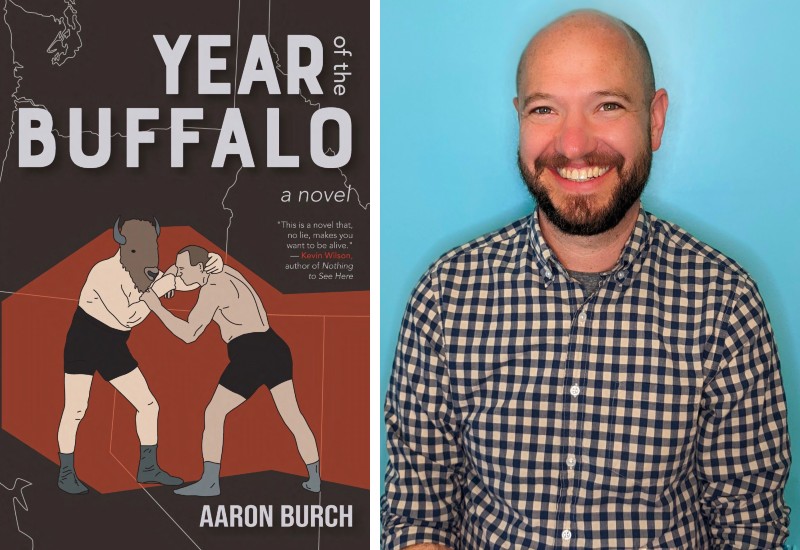
Aaron Burch captures the spirit of a road trip in his novel, Year of the Buffalo. The long drive sets the stage for bonding, observations, and memories shared between brothers Ernie and Scott as they travel from Washington state toward Detroit.
In this third-person novel, the focus shifts from character to character. On the road, Ernie reflects:
They were doing it. He’d agreed to the trip not because of any desire to return to Michigan but just because. Because he had no reason not to, because it seemed like Scott wanted him to go, because why not? But wasn’t this what roadtrips were supposed to be? Revelatory and epiphanic and life-changing and life-answering and everything else about life that he was searching for, everything he thought the farm might be able to be and now believing a cross country roadtrip was definitely going to be. There was a simplicity to the moment—two guys driving, taking their time, without consequence.
Travel by car—or SUV for Ernie and Scott—may be all those things, but the journey also emphasizes the tension and strong need for reconciliation between the two siblings.
The road trip takes on a life if its own as the two men discover secrets about each other. Scott, once a professional wrestler, grapples with the distinction between his persona and self, as does Ernie. The wrestling persona of Mr. Bison must come to life again since the brothers are on their way to promote Scott’s new video game. One of their many interactions reveals the pressure that comes from its reappearance:


































